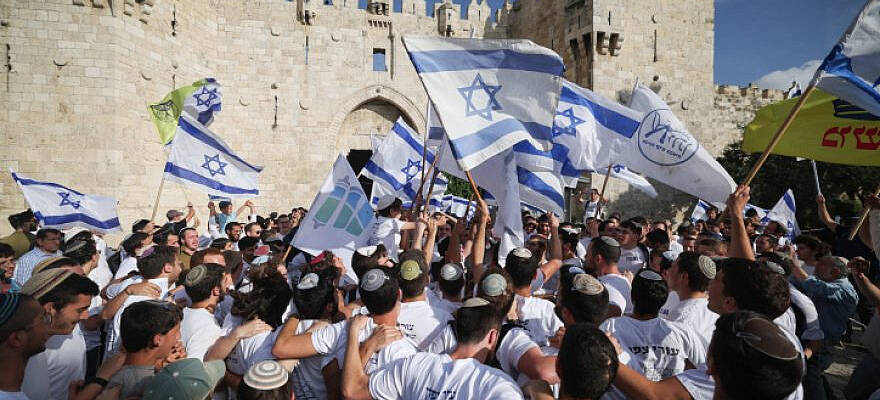According to data published by Israel’s Central Bureau of Statistics ahead of Jerusalem Day, Jerusalem surpassed one million residents, adding 13,400 residents last year.
By Yori Yalon and JNS
As Jerusalem marks the 57th anniversary of its reunification, police have approved plans for the annual flag march to pass through the Old City’s Damascus Gate and Muslim Quarter on its way to the Western Wall.
Over 3,000 police officers and border guards will secure the march and other events scheduled for Wednesday. The march will commence at 4 p.m. from City Hall’s Safra Square, proceeding through the Old City’s gates, including Damascus Gate, before culminating at the Western Wall plaza with a main ceremony at 7 p.m.
“While recent months have seen attempted attacks in the capital, there is currently no specific threat regarding the flag march,” according to a police spokesperson. Nonetheless, stringent security measures will be implemented, including aerial surveillance and undercover operations.
Major road closures are expected from 2 p.m., disrupting traffic and public transportation in central Jerusalem. The city’s light rail will operate partially between certain stations from 4:30 p.m. until 8 p.m.
Jerusalem Day commemorates the reunification of the city during the 1967 Six-Day War, an event of profound historical and religious significance for the Jewish people.
This year’s celebrations will include guided tours, lectures and cultural performances highlighting Jerusalem’s rich heritage.
According to data published by Israel’s Central Bureau of Statistics ahead of Jerusalem Day, the country’s largest city has surpassed one million residents, adding 13,400 residents last year, with most of the new residents coming from Bnei Brak, Beit Shemesh and Tel Aviv-Yafo.
The latter two cities, plus Betar Illit, were the localities which welcomed the most out-migration from Jerusalem.
Jews and other non-Arab populations made up 60.5% of the city’s residents at the end of 2023, with Arabs comprising 39.5%. Around 29% of all of the city’s residents were ultra-Orthodox Jews, representing about half of the non-Arab population.
Jerusalem’s total fertility was 3.68 children per woman, exceeding the national average birth rate of 2.89. The total fertility rate of Jewish and other non-Arab Jerusalemites was 4.3, compared to the national average of 2.9.
The total fertility rate for Arab women in Jerusalem was 2.81, compared with 2.75 on the national average.
Other statistics of note include the city’s workforce participation rate in 2023, which was 52.2% compared to the national average of 63.5%.
Jerusalemites are as satisfied with their lives as the rest of Israel, at 91% compared 90% nationally, with 93% of Jews and 86% of Arabs. They are also satisfied with their work at 87%, versus 89% nationally.
